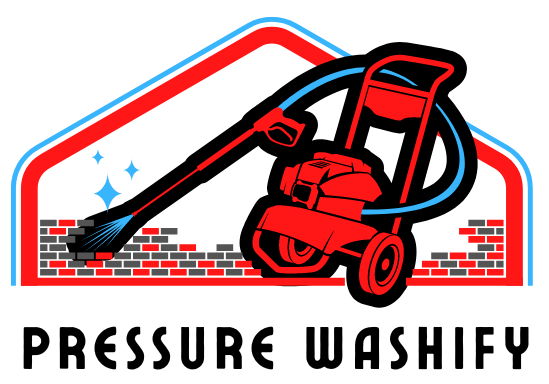Affiliate Disclaimer: This post may contain affiliate links, meaning we get a commission if you decide to make a purchase through our links, at no extra cost to you.
Are you struggling to rid that stubborn grime off your patio? Is your car looking more mud-brown than shiny black? Or maybe those garden slabs seem less colorful than you remember?
Hoses are the unsung heroes of the pressure-washing world. You might not give it a second thought, but the type of pressure washer hose you use can be the difference between a so-so-clean and a sparkle that screams “Wow!”.
But where do you even start in making sense of these crucial components? Is there really that much difference between one hose and another? And to add to the complexity, how do you pair the perfect hose with its pressure washer partner?

Different Types of Pressure Washer Hoses
With a plethora of pressure washer hoses on the market, narrowing down your choices can be a daunting task – but don’t fret! We’re here to break it down and help you choose the perfect hose for you and your cleaning needs.
1. Material
Pressure washer hoses are commonly made from three types of material:
- PVC (Polyvinyl chloride): These hoses are the most common because they’re lightweight and affordable. However, they’re not as flexible or durable as other materials. PVC hoses are best suited for light-duty tasks like washing your car or hitting those pesky cobwebs.
- Rubber: The MVP of flexibility and durability, rubber hoses are generally heavier than their PVC counterparts. Despite the extra weight, these hoses are crack-resistant and perfect for heavy-duty cleaning sessions. Choose a rubber hose if you’re looking for a long-lasting companion to survive the toughest dirt battles.
- Polyurethane: A sweet mix of durability and flexibility, polyurethane hoses bridge the gap between PVC and rubber. Neither too light nor too heavy, these hoses offer a practical balance and work well with various cleaning tasks.
2. Diameter
The diameter of your pressure washer hose is the unsung factor that determines how powerful your water flow will be. Generally, hoses come in three different diameters:
- 1/4 inch – The petite powerhouses: These are the most common diameter for residential use, ideal for cleaning small to medium-sized areas like cars, driveways, and decks.
- 5/16 inch – The middleweights: Providing a balance between pressure and flow rate, these hoses are suitable for homeowners who want a bit more power to tackle larger areas or stubborn dirt.
- 3/8 inch – The heavy hitters: Reserved for commercial use, these hoses deliver high pressure and flow rates. They are perfect for unstoppable cleaning forces taking on gigantic tasks like multi-level buildings or parking lots.

Selecting the Perfect Pressure Washer Hose for You
Consider these factors when buying a pressure washer hose:
1. Connection Compatibility
Before anything else, ensure your pressure washer hose’s connectors match your pressure washer. Pressure washer hose connectors come in three varieties: M22, 3/8″ quick connect, and 1/4″ quick connect. Consult your pressure washer’s user manual to determine which connection type is compatible with your machine. There’s nothing worse than bringing home an exciting new addition to your cleaning arsenal only to realize it doesn’t fit!
2. Hose Length
Selecting the right length for your hose is essential to achieve optimal cleaning results. Too short, and you’ll be constantly repositioning your pressure washer; too long, and you’ll be dealing with kinks and tangles. Keep in mind that the pressure decreases as the hose length increases, so consider the size of your cleaning area and your desired pressure when deciding on the hose length. Generally, hoses are available in 25, 50, or 100-foot lengths.
3. Working Pressure & Burst Pressure
The working pressure refers to the maximum pressure your hose can handle consistently, while the burst pressure signifies the point at which your hose could potentially fail. Ensure that you choose a hose that can accommodate the highest pressure your machine can produce. As a rule of thumb, the burst pressure should be at least four times the working pressure to downplay the risk of hose failure.
4. Temperature Tolerance
Some cleaning tasks may require hot water, and not all hoses are designed to handle high temperatures. Keep your cleaning needs in mind when selecting your pressure washer hose. If hot water cleaning is your priority, look for hoses that can manage temperatures above 140°F.
5. User Comfort
Last but not least, think about what feels comfortable for you to use. If you struggle with a heavier hose, choose a lighter material like PVC. If flexibility is high on your must-have list, opt for a rubber or polyurethane hose.
Top Pressure Washer Hose Picks
To help you make an informed decision, we have selected the top pressure washer hoses from renowned brands. This selection is based on our personal experience and customer feedback.
1. Flexzilla Pressure Washer Hose
Category: The Rubber Wizard
- Known for its incredible flexibility – handling bends and turns while maintaining pressure, this is our pick for the best rubber hose.
- It’s abrasion-resistant and weather-tested, ensuring long-lasting durability.
- Particularly useful for commercial applications or heavy-duty domestic use.

2. Generac 6621 Pressure Washer Hose
Category: The PVC Maestro
- Affordable and lightweight, this PVC hose is perfect for homeowners tackling light-duty tasks.
- Despite its affordability, it doesn’t skimp on strength, assuring a working pressure of up to 3100 PSI.

3. Twinkle Star High-Pressure Washer Hose
Category: Wire-braided rubber
- This hose is available in different diameters for various needs.
- It promises a working pressure of 4000 PSI, making it suitable for more heavy-duty tasks.
- The M22 metric female fitting on both ends ensures it can fit most pressure washers.

4. Red UBERFLEX Kink Resistant Pressure Washer Hose
- Brilliantly built for flexibility and kink resistance.
- Its ProPulse technology offers superior resistance to kinking.
- It promises a working pressure of 3700 PSI, perfect for those demanding cleaning tasks.
Read our detailed blog post and review for Uberflex Hoses.

These hoses offer a fantastic range of features that cater to various needs, preferences, and budgets. So whether you’re a first-time buyer or looking for an upgrade, these top choices won’t disappoint!
Pressure Washer Hose Maintenance Tips & Tricks
Follow these maintenance and expert tips to keep your hose in tip-top shape:
1. Say No to Kinks
Kinks are the bane of pressure washer hoses. Continual bending and twisting can cause weak spots which ultimately lead to leakages or even hose failure. Make sure you’re gentle when unwinding, and remember to store your hose without any sharp bends or kinks.
2. Keep It Clean
Ironically, the device that cleans might need some cleaning itself! After each use, flush your pressure washer hose with clean water to remove any dirt, debris, or soap residue. Taking this simple step prolongs the lifespan of your hose and pressure washer.
3. Inspect Frequently
Regularly check your hose for signs of wear and tear. Look for cracks, bulges, or leaks, and replace any damaged sections promptly. Don’t forget to examine the hose fittings, too! Loose or worn-out fittings can lead to pressure loss or water leakage.
4. Avoid Extreme Temperatures
Extreme heat or cold can impact the durability of your hose. Store it in a clean, dry place away from direct sunlight, excessive heat, and freezing temperatures. If hot water cleaning is a staple in your routine, make sure your hose is specifically designed to handle high temperatures.
5. Roll It Up Right
When it’s time to store your hose, use a hose reel or coil it up loosely by hand. Avoid tight loops or pulling the hose too tightly around sharp corners – this can lead to stress points and affect the hose’s integrity.
6. Replace When Necessary
Despite your best efforts, the lifespan of a hose ultimately has its limits. If you notice any significant damage or consistent performance decline, it might be time to retire your hose and invest in a new one.
When your trusty pressure washer hose faces damage, it’s not the end of the road! Whether it’s a stubborn leak, a pesky crack, or an unsettling bulge, read our detailed guide on How To Fix a Pressure Washer Hose.
Frequently Asked Questions about Pressure Washer Hoses
Q1: What types of pressure washer hoses are available?
A: Three common types are available:
- PVC/plastic hoses: Most basic & most affordable.
- Rubber hoses: More expensive but also more durable.
- Wire-braided hoses: Heavy-duty, long-lasting choice.
Q2: What length of hose should I choose?
A: The ideal length depends on your specific needs. In general, lengths vary from 20 to 100 feet. Consider your cleaning tasks and the distance you need to cover. Remember that longer hoses may reduce water pressure.
Q3: How do I prevent my pressure washer hose from kinking?
A: Always unkink your hose before using it. After usage, wind it in loose, large loops for storage. You can also use a hose reel to prevent kinking.
Q4: How often should I replace my pressure washer hose?
A: That depends on usage and maintenance, but typically, hoses last between 5-7 years with regular use.
Q5: Can I use a regular garden hose as a pressure washer hose?
A: No, pressure washer hoses are designed to withstand high pressure. Regular hoses could burst under the force.
Q6: How can I increase the lifespan of my pressure washer hose?
A: Regular inspections, proper storage, and gentle unwinding will prolong your hose’s life. Always clean the hose after use to prevent the build-up of dirt or soap residue.
Q7: What happens if I use a damaged pressure washer hose?
A: A damaged hose can significantly reduce the cleaning power of your machine and could potentially be unsafe. If your hose is cracked, has leaks, or bulges, replace it immediately.









